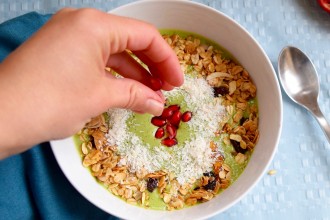Dominik has recently started to really explore his vocal cords. He has been “talking” to us for quite a while now and even giggling every now and then. Now, in addition to his baby babble, he will also screech, yell, and make all kinds of interesting noises. I love listening to him and watching his looks of amazement at his own voice. Plus, it is the sweetest voice I’ve ever heard, even when he is screeching.
This is a great step towards language development for Dominik. He’s not only learning how to make loud and soft noises, but initiating the development of tone and sound variation as well as discovering how to make the sounds of different consonants and vowels. The first six months of an infant’s development of the language area of the brain is devoted to sorting out the various sounds that they hear around them, imitation is a key part of this. It is during the first three years of life that the child goes through a “sensitive period”, meaning they are particularly able to learn language (and even differentiate between different languages). Missing a sensitive period makes it difficult for language to be acquired.
So how to nurture language development? Talk to your baby! I try to tell Dominik about what we are doing at any particular part of the day. For example, during bath time, I tell him about how I am undressing him, counting the buttons, explaining that we are moving to the bathroom, telling him about the warm water, etc. That way, he is not only being exposed to language but also to the meanings behind what I am saying. Simply creating more connections for him.
I also read to Dominik. I feel like lately I’ve seen a ton of articles about how doctors are recommending that parents read to their babies. I totally agree because it’s seriously one of the most beneficial things you can do for your baby’s language skills. Mostly, I read simple and short children’s books because his attention span is rather short. But the point is that he is being introduced to both spoken and written language (and hopefully gaining a love of books). When we read aloud, the variations and rhythm of our words is slightly different than normal conversation. Reading out loud helps an infant to hear the gentle rhythm of words. Plus if I read something like Dr. Seuss, he can also hear rhyming, more subtle differences between words, and the musical qualities of poetry.
However, I’m not constantly talking his ear off. Babies also need quiet time to let their brains catch up and process what they have experienced. Especially if Dominik is focused on a toy or task, I’ll sit quietly and wait for him to absorb what he is doing. Baby’s are learning constantly and can be easily overwhelmed. Too much information at once can be too confusing, the result being that none of it is being processed. I know when I am in a new place or situation, it’s often hard to notice details or anything other than what is totally necessary.
Happy reading!





